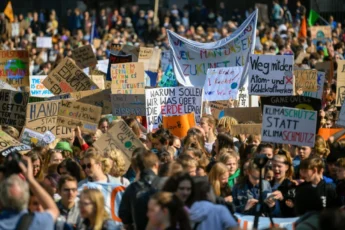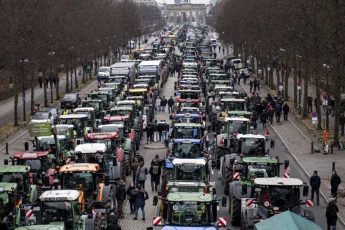
In December the TSS hosted a meeting on climate crisis and class conflicts in the Green Transition, with participants from different countries, involved in struggles and debates revolving around the transformations brought by climate change and its political, social and economic impacts. During the discussion we recognized the so-called Green Transition as a key moment of the post-pandemic reconstruction of production processes, reinforced in European countries by the mobilization of money and political rhetoric condensed in the recovery and resiliency plan. Through a series of publications and future meetings, we aim to open a wider space of discussion across countries, where the opposition between ecological struggles and workers struggles can be addressed, information can be exchanged, and collective strategies can be adopted to face the changing political scenario of the present times. We publish here below a text and two parallel petitions written by our friends of the environmentalist collective “class struggle and climate protection” and the workers at the Bosch factory in Munich fighting together against the closure of the automotive plant.
Highlights // Open Questions:
- Climate movements demand change, but they are being instrumentalized by governments and employees to support plans for a green transition that makes workers pay the prize of years of industrial exploitation. What change are we calling for? Who are our real allies and who are our true enemies?
- The situation at the Bosch factory is like the one in many automotive factories throughout Europe or in mining regions. Layoffs are described as necessary to convert production and workers are equated with polluting factories. How do we say no to layoffs, no to the use of the transition for worsening living standards and working conditions?
- It is not the first time Bosch tries to close the plant in Munich. It happened already in 2009, during the financial crisis. They present it today as a climate friendly measure, but they are simply moving production and emissions to another corner of the Earth where wages are lower and emissions can be higher. How can we build connections between workers and unions in the different knots of the production chains?
- It’s not clear then why Bosch is planning to close the plant and not to reconvert it to produce different items. The truth is that it is taking advantage of the transition and public funding to reshape its whole multinational organization, get rid of more stable workers, maximize profits by searching for the lowest possible wages. How can we fight not only locally, for the sake of one workplace, but to have a say on this entire transnational restructuring at the expenses of workers, not only in Munich but in several other places?
What do we mean by climate protection?
by ‘KLASSENKAMPF UND KLIMASCHUTZ’ and BOSCH FACTORY WORKERS (Munich, Germany)
The global average temperature is rising. This is due to the so-called greenhouse effect. Our atmosphere is turning into a greenhouse. The heat from the sun hits the Earth but is no longer reflected back into space. The extra energy changes air currents, causing ice caps to melt and ocean currents to dry up. The result: storms, floods and extreme temperatures increase. The more energy trapped on Earth, the more often these extreme weather events will occur.
If this trend continues, entire countries will become uninhabitable in the coming decades. Already, Indonesia is looking for a new capital city because it is clear that Jakarta will sink. In the coming years and decades, droughts and resource scarcity will steadily increase. And the disappearance of entire swaths of land will drive millions of people to flee.
Those who already have a difficult life will suffer most from all these developments. Those who cannot afford a second home in a cooler spot. Those who don’t have a garden or sophisticated cooling systems for their home. The ones who can’t afford to buy new furniture, a new car, or a computer immediately after floods.
We must prevent the greenhouse around our earth from closing more and more. We don’t have much time left to do that.
This means we need to burn fewer fossil fuels like gas, oil and coal. And we have to do it: Now. We can only do that if we start replacing all appliances that burn gas, oil or coal. Contrary to what is often portrayed, this is not about deindustrialization. On the contrary, we need to produce millions of new products in as short a time as possible. In Germany alone, for example, 20 million gas and oil heating systems need to be replaced, new trains and buses need to be manufactured. And above all: new energy sources must be developed. We need tens of thousands of wind turbines and – according to forecasts – about ten times as many solar plants as exist today.
Above all, we need people who can manufacture these necessary products. In millions of units, precisely and reliably. Climate protection is implemented by workers, not by fine words from politicians or bosses.
The most important opponent of the climate movement are the owners of the factories and power plants. They have no interest in measures that would avoid greenhouse gases. This would only reduce their profits. They have no interest in shutting down coal-fired power plants. They have no interest in manufacturing other products in their factories, this means investments for them, why should they carry these out, if they can continue to make profits with the existing products? And they make sure that the existing products are considered to have no alternative. With their power, which is fed by their wealth, they create the framework conditions that their products are sold on.
As a climate movement we demand change. But we have to be very clear how this change has to be shaped: We must fight for change that doesn’t benefit the already rich and plunge everyone else into the abyss. Instead of fighting for a CO2 price, we must fight for a change in production. Instead of blowing billions of dollars up the factory owners’ asses for this change and then allowing them to take their profits out of the factories again. We have to fight with the workers in the factories, because they are the ones who make the change and produce new products.
We see a fatal development: the measures proposed by the politicians mean, as always in capitalism that the risk should be socialized, it should be borne by all, especially by those who work every day and, in the end, have to see how they make ends meet. The profits are to be privatized, i.e. pocketed by those who are swimming in money and who are also responsible for exploitation and the climate crisis.
Let’s fight back! Let’s fight against the factory owners! Let’s fight with the workers for the preservation of the factories that we need so urgently. Let’s fight for real change! Let’s fight for a production that benefits us all!
#1 Petition by Bosch workers: Maintain plant, convert production!
We are employees of the BOSCH plant in Munich Berg am Laim. Some of us have been working at the plant for decades. Now they are trying to put us out on the street under the guise of climate protection. We will not accept this. We demand the preservation of our plant and the conversion of production to climate-friendly products.
Climate change is one of the greatest threats of our time. In many publications, CEO Volkmar Denner has pointed out the dangers posed by climate change. Now, in July, it was announced that our site was no longer economically viable due to the switch to electromobility. That is why the plant is now to be closed. The repeated statements about the need for electromobility to combat climate change and the now added statement that our plant is “directly affected” by the change in the automotive industry are an attempt to portray it as if the closure of our plant is necessary for climate protection.
We are resisting this attempt to close our plant under the guise of climate protection and are calling for our site to be retained and for a switch to climate-friendly production.
The attempt to relocate our plant to Nuremberg, the Czech Republic or Brazil has only one reason: It is expected to generate greater profits. This desire, and not climate protection, is behind the closure.
For 12 years, we have given up parts of our wages and our Christmas bonuses for the promise that we would be able to continue working here in the future. BOSCH now wants to break this promise. We will not accept that.
There is a wide range of products that could be manufactured here at the plant and that would be useful for a climate-friendly future. In recent years, we have repeatedly made proposals for transforming production toward climate-friendly products. These have always been blocked by the management.
We hereby demand the preservation of the plant and a transformation of production towards climate-friendly products. Through years of waiving parts of our salary and decades of work at the plant, we have been given a right to this plant. We hereby call on BOSCH to preserve the plant and to give us the opportunity to convert production.
#2 Petition by climate activists: Maintain plant, convert production!
We are climate activists and support the demand of the employees of the BOSCH plant in Munich Berg am Laim for the preservation of the plant and the conversion to climate-friendly production.
Time and again, politicians and industry make the claim that climate protection requires layoffs. By equating the end of the fossil fuel industry with the unemployment of coal workers and employees in the automotive industry, an artificial opposition is created between the employees of these industries and the climate movement.
Climate change is the greatest threat of our time. To counter it, we not only need an end to the fossil fuel industry. We also need a shift from production based on profit to production based on social utility. In Germany alone, there is currently a shortage of thousands of wind turbines, solar panels, trains and buses for public transport. If one does not go by the measure of profit, but by social usefulness, the production of medical devices, of energy-efficient plants and technologies for the energy turnaround should have the highest priority.
Millions of people still work in the automotive industry in Germany. They are the ones who have the skills to manufacture all the products and devices we need for a climate-friendly society in the future. With their demand for a change in production to climate-friendly products, the employees of the BOSCH plant are thus in the front row in the fight for a climate-friendly future.
We will loudly and emphatically support them in this demand at every level and hereby demand that their plant be retained, and that production be converted to climate-friendly products.





